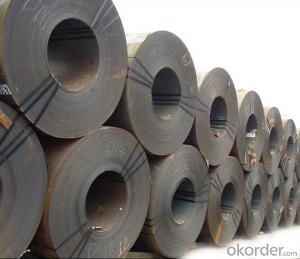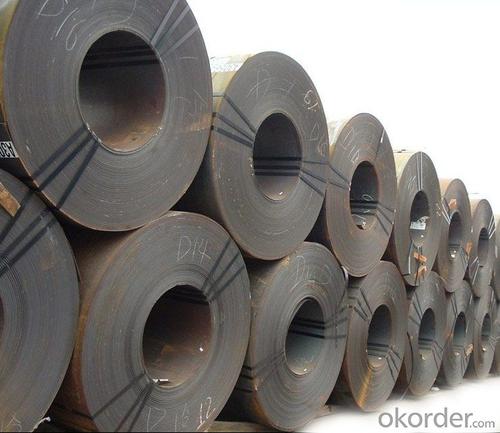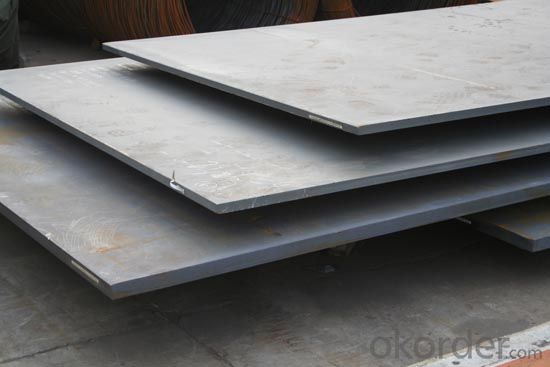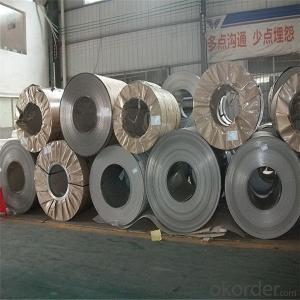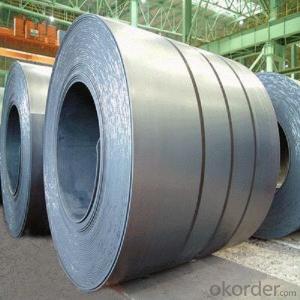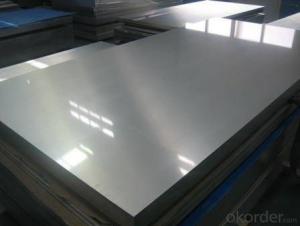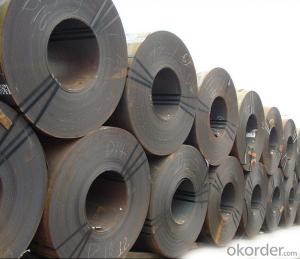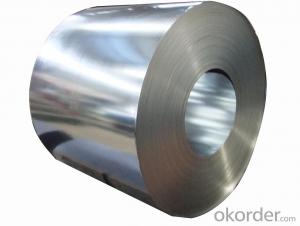Hot Rolled Steel Coils, A36,SS400,Q235B,SPHC
- Loading Port:
- China main port
- Payment Terms:
- TT OR LC
- Min Order Qty:
- 25 m.t.
- Supply Capability:
- 2000000 m.t./month
OKorder Service Pledge
OKorder Financial Service
You Might Also Like
Product: | Hot Rolled Steel Coils/Sheets |
Material: | Q195,Q235,A36,SS400,S235JR,Q345,ST37-2, CCSB etc |
Standard : | JIS G3002 GB/T251B |
Technique: | hot rolled |
Thickness | 1.2mm to 200mm |
Tolerance of thickness: | :+/-0.03mm |
Width: | 750mm-2000mm |
Tolerance of width: | :+/-5.00mm (aiming to +/-2.00mm) |
Normal width: | 914mm, 1000mm, 1200mm, 1219mm, 1250mm,1500mm |
Length: | According to requirement |
Coil ID: | 508mm-610mm |
Coil Weight: | 10-25 Metric Tons |
Surface: | Black, Chromate, fingerprint resistant treatment, slight oiled or non-oiled, dry |
Port of Loading: | Tianjin/Shanghai port |
Packaging Details: | Standard export packing or according to the clients required |
components | C
| Si
| Mn
| P ≤ | S ≤ | N | TAl | V | Nb | Ni |
0.06-012 | 0.15-0.30 | 0.25-0.50 | 0.030 | 0.030 | ||||||
Use | Various types of steel components for riveting, bolting, welding. | |||||||||
size | 3000-118800mm*1500-4000mm*6-700mm | |||||||||
Thickness | 6-700mm | |||||||||
Standard | DIN17100 | |||||||||
Material | ST37-2 | |||||||||
Packing | According to the demand of the customer | |||||||||
Surface treatment | Hot-rolled | |||||||||
- Q: What is the width range of steel coils?
- The width range of steel coils can vary depending on the specific type and purpose of the coil, but it typically falls within the range of 600 mm (23.6 inches) to 2,200 mm (86.6 inches).
- Q: What are the common applications of hot-dip galvanized steel coils?
- Hot-dip galvanized steel coils are widely utilized across various industries due to their exceptional resistance to corrosion and long-lasting durability. These coils find numerous applications in different sectors, including construction, automotive, appliances, agriculture, electrical and telecommunication, transportation, and industrial sectors. The following are some of the common uses of hot-dip galvanized steel coils: 1. Construction: The construction industry extensively relies on hot-dip galvanized steel coils for applications like roofing, siding, gutters, and downspouts. The coils' corrosion resistance ensures that structures can withstand harsh weather conditions, resulting in low-maintenance and long-lasting buildings. 2. Automotive: In the automotive sector, hot-dip galvanized steel coils are widely employed for manufacturing body panels, frames, chassis, and structural components. These coils provide enhanced protection against rust and offer high strength, ensuring the longevity of automotive parts. 3. Appliances: Hot-dip galvanized steel coils are utilized in the production of various household appliances such as refrigerators, air conditioners, ovens, and washing machines. The coils' corrosion resistance and aesthetic appeal make them an ideal choice for these appliances. 4. Agriculture: The agricultural sector commonly uses hot-dip galvanized steel coils for constructing greenhouses, livestock shelters, fences, and irrigation systems. The galvanized coating protects the steel from corrosion caused by exposure to moisture and chemicals commonly found in agricultural settings. 5. Electrical and Telecommunication: The electrical and telecommunication industries employ hot-dip galvanized steel coils for manufacturing transmission towers, poles, cable trays, and electrical conduits. These coils' corrosion resistance and high strength ensure the safety and reliability of these infrastructure components. 6. Transportation: Hot-dip galvanized steel coils play a significant role in the transportation industry, particularly in manufacturing trailers, shipping containers, and chassis components. The galvanized coating provides protection against corrosion caused by road salt, moisture, and various environmental factors. 7. Industrial Applications: Hot-dip galvanized steel coils are widely used in various industrial applications, including storage tanks, pipelines, ductwork, and industrial equipment. The coils' corrosion resistance and durability ensure the integrity and longevity of these structures and equipment. In conclusion, hot-dip galvanized steel coils have a wide range of applications in industries such as construction, automotive, appliances, agriculture, electrical and telecommunication, transportation, and industrial sectors. The coils' corrosion resistance, durability, and aesthetic appeal make them a versatile and extensively used material in these applications.
- Q: Can steel coils be welded together?
- Yes, steel coils can be welded together. Welding is a common technique used to join metals, including steel coils. It involves melting the edges of the coils and fusing them together using a filler material. This process creates a strong and durable bond between the coils, allowing them to be joined and used as a single unit. Welding steel coils together is commonly done in various industries, such as manufacturing, construction, and automotive, to create larger structures or components. However, it is important to ensure proper welding techniques and quality control measures are followed to ensure the integrity and strength of the weld joint.
- Q: How do steel coils contribute to the manufacturing of agricultural machinery?
- The manufacturing of agricultural machinery heavily relies on steel coils, which play a vital role in this process. Typically, these coils are crafted from top-notch steel that possesses exceptional strength, durability, and resistance to corrosion. To begin with, agricultural machinery heavily relies on steel coils for the construction of its main structural components, including the chassis, frames, and supports. These components must endure heavy loads, extreme weather conditions, and rough terrains. Thanks to the strength and resilience of steel coils, the machinery can effectively handle these challenging environments and operate efficiently. In addition, steel coils find application in the production of various moving parts and mechanisms within agricultural machinery. For example, gears, shafts, and axles, which are crucial for power transmission and rotational motion transformation, are created using steel coils. The high tensile strength and excellent machinability of steel make it an ideal material for these essential components, ensuring their reliability and longevity. Moreover, steel coils contribute to the manufacturing of agricultural machinery by providing a protective layer against wear and tear. Often, these coils are coated with specialized finishes or paints to enhance their resistance to rust, chemicals, and abrasion. This protective layer significantly prolongs the machinery's lifespan, reduces the need for frequent maintenance and repairs, and ultimately increases its overall efficiency and productivity. Furthermore, the versatility of steel coils allows for customization and adaptation to meet the specific requirements of agricultural machinery. Manufacturers can shape and mold the coils into different sizes and dimensions, enabling the production of machinery suitable for various farming practices and applications. Whether it's tractors, harvesters, or irrigation systems, steel coils are crucial for creating versatile and dependable agricultural machinery. In conclusion, steel coils are essential in the manufacturing of agricultural machinery due to their strength, durability, resistance to corrosion, and customization capabilities. From structural components to moving parts and protective coatings, steel coils greatly contribute to the efficiency, reliability, and longevity of agricultural machinery, thus providing significant support to the global agricultural industry.
- Q: I have a belly button piercing and the metal is stainless steel.. I was wondering does it develop rust whenever you go shower and clean it? Can I still swim in the summer with it or do I have to take it out? What happens if I swim in the pool with it?
- No it won't rust. Just make sure to get the pool water out of the piercing when done at the pool. Just to avoid drying out the skin too much.
- Q: Are steel coils used in the aerospace industry?
- Yes, steel coils are used in the aerospace industry.
- Q: How are steel coils used in the manufacturing of exhaust systems?
- Steel coils are used in the manufacturing of exhaust systems as they provide the necessary raw material for forming various components such as pipes, mufflers, and brackets. The coils are typically processed through cutting, bending, welding, and shaping techniques to create the specific parts required for the exhaust system.
- Q: is stainless steel a good steel for sensitive skin? or does it have to be surgical or sterling silver?
- Surgical stainless steel 316LVM is good, 316L is nowhere near in quality. Its very unusual for someone to have a reaction to surgical steel. Avoid plain stainless steel. Titanium is better, tougher and lighter. And contains less nickel than surgical steel, pretty close to nothing. Its pretty much impossible to be allergic to good quality titanium. Niobium contains no nickel, but only comes as CBRs, and is pretty expensive and unusual. Silver and gold should be avoid in piercings. They have to mix it with so much other junk so that its strong enough, really high nickel content.
- Q: I have a necklace that has a pendent made out of stainless steel. The pendent is connected by a cord, not chain, that I can take on and off; so, I leave it on all the time. It has gotten pretty tarnished because of that.
- When okorder okorder /
- Q: Is a steel plate the same as a steel coil?
- Generally speaking, they can be used interchangeably, and the purchase price of the plate is slightly cheaper.
Send your message to us
Hot Rolled Steel Coils, A36,SS400,Q235B,SPHC
- Loading Port:
- China main port
- Payment Terms:
- TT OR LC
- Min Order Qty:
- 25 m.t.
- Supply Capability:
- 2000000 m.t./month
OKorder Service Pledge
OKorder Financial Service
Similar products
Hot products
Hot Searches
Related keywords
